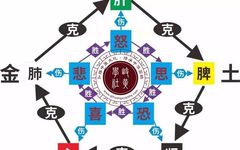Traditional Chinese Medicine Health, Classics of Wellness, Wishing You Continuous Health
More
Knowledge
Understanding
Follow us for daily wellness knowledge.
Learn the wisdom of staying healthy.
Qi Huang Learning SocietyMaking Traditional Chinese Medicine More Beautiful | More Interesting | More Relevant to LifeHow much do you know about the pathogenic characteristics of the seven emotions? Recently, students in our Qi Huang Learning Society TCM training camp asked about the seven emotions, and today I will share detailed insights here.
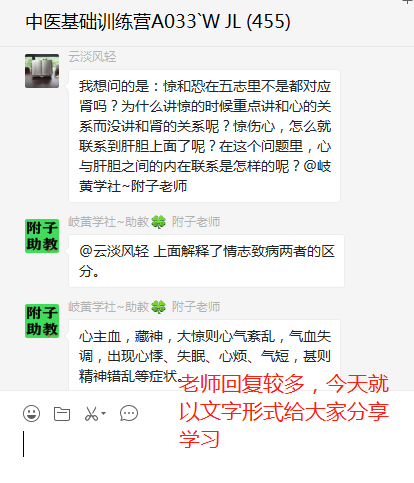
Internal injury causes, also known as internal damage, refer to pathogenic factors that arise from a person’s emotions or behaviors that exceed the body’s self-regulatory capacity, directly harming the organs and causing disease, such as internal injury from the seven emotions, inappropriate diet, and improper work-rest balance. Internal injury causes lead to imbalances in the organs’ qi, blood, yin, and yang, resulting in disease. Diseases caused by internal injury are termed internal injury diseases.
Internal injury causes are contrasted with external pathogenic factors, as the disease arises from within rather than from external evils, hence the term internal injury.
Basic Concepts of the Seven Emotions
The seven emotions refer to the normal emotional activities of joy, anger, worry, thought, sadness, fear, and shock, which are responses of human consciousness to external events. The seven emotions are closely related to the functional activities of the body’s organs.
The seven emotions correspond to the five organs, with joy, anger, thought, sadness, and fear representing the five desires.
The seven emotions are different reflections of a person’s response to objective phenomena, and generally, within normal activity ranges, they do not cause illness. Only sudden, intense, or prolonged emotional stimuli that exceed the body’s normal physiological activity range can disrupt the body’s qi mechanism and lead to imbalances in the organs’ yin, yang, and blood, resulting in disease.
Thus, as a pathogenic factor, the seven emotions refer to excessively intense, prolonged, or sudden emotional changes that lead to imbalances in the organs’ qi, blood, and yin-yang, causing disease. Diseases caused by the seven emotions are termed diseases due to stagnation. Additionally, certain chronic diseases can lead to long-term dysfunction of the organs, resulting in abnormal emotional states, termed diseases leading to stagnation.
The seven emotions are also related to the body’s tolerance and regulatory capacity.
The pathogenicity of the seven emotions differs from the six excesses, as the six excesses primarily invade the body through the mouth, nose, or skin, while the seven emotions directly affect the relevant organs and cause disease.
The seven emotions can not only trigger various diseases but also significantly influence the progression of diseases, promoting improvement or deterioration.
Since the seven emotions are one of the main pathogenic factors causing internal injury diseases, they are also referred to as “internal injury from the seven emotions.”
Relationship Between the Seven Emotions and the Organs, Qi, and Blood:
The Relationship Between the Seven Emotions and the Organs
The relationship between the seven emotions and the organs: the emotional activities of the human body are closely related to the organs.
The basic principles are:
The heart governs joy; excessive joy harms the heart.
The liver governs anger; excessive anger harms the liver.
The spleen governs thought; excessive thought harms the spleen.
The lungs govern sadness and worry; excessive sadness and worry harm the lungs.
The kidneys govern shock and fear; excessive shock and fear harm the kidneys.
This indicates that organ changes can lead to corresponding emotional responses, and excessive emotional responses can damage the related organs.
The theory that the seven emotions arise from and harm the five organs has significant guiding implications in diagnosis and treatment.
The Relationship Between the Seven Emotions and Qi and Blood
The relationship between the seven emotions and qi and blood: qi and blood are the two fundamental substances that constitute the body and maintain life activities.
Qi has a warming and promoting effect on the organs, while blood nourishes the organs.
Qi and blood are the material basis for the spiritual and emotional activities of the body, and emotional activities are closely related to qi and blood.
Changes in the organs’ qi and blood can also affect emotional changes.
Thus, it is said: “When blood is abundant, there is anger; when it is insufficient, there is fear.” The physiological activities of the organs must be based on qi and blood, while spiritual and emotional activities are manifestations of the physiological functions of the organs, so the emotional activities of the body are closely related to the organs’ qi and blood.
Related to Mental Stimuli:
The seven emotions are classified as mental pathogenic factors, and their onset must be related to significant mental stimuli.
Throughout the course of the disease, changes in emotions can lead to significant changes in the condition.
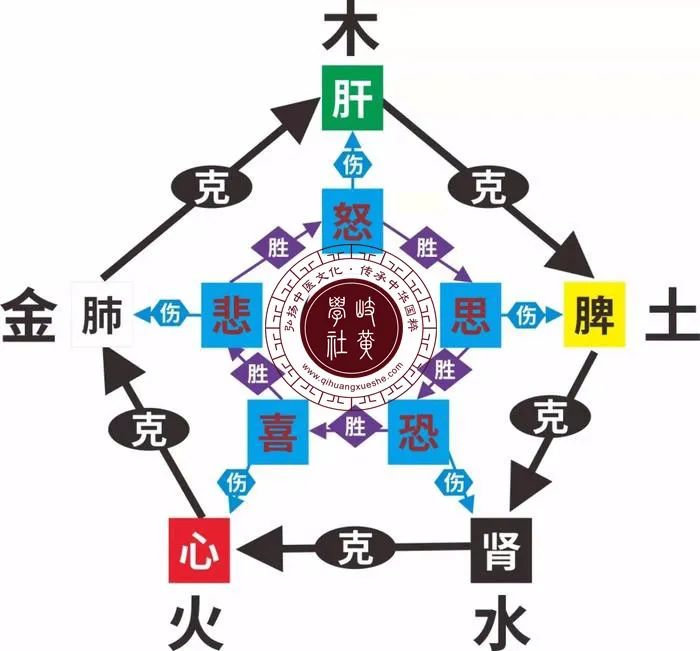
For example, epilepsy is often caused by emotional injury; worry injures the liver, leading to liver qi stagnation, which harms the spleen, causing the spleen to lose its healthy function, resulting in internal phlegm and qi rising, clouding the mind, leading to loss of control.
Mania is often caused by anger, sadness, and resentment, which harm the liver and gallbladder, leading to repressed emotions that transform into fire, scorching fluids, resulting in phlegm-fire, which disturbs the heart and mind, causing confusion.
This shows that mental factors play an important role in the occurrence and development of diseases.

Directly Harming the Organs:
Excessive emotions can affect the activities of the organs and produce pathological changes.
Different emotional stimuli can harm different organs, resulting in various pathological changes.
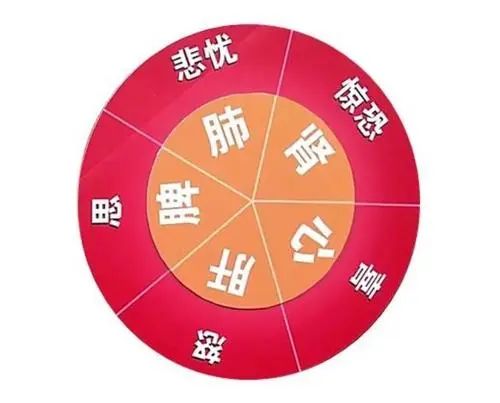
For example, joy harms the heart; when the heart is harmed, it leads to palpitations, scattered thoughts, inability to concentrate, and in severe cases, mental disorders.
Although excessive emotions can harm the five organs, the relationship with the heart and liver is particularly close.
The heart is the master of the five organs and six bowels; all life activities are manifestations of the functions of the five organs, which must be unified under the heart’s control. Damage to the heart spirit inevitably involves other organs.
Liver dysfunction and qi stagnation are also key mechanisms in the onset of emotional diseases.
The heart governs blood and houses the spirit; the liver stores blood and governs the smooth flow; the spleen governs transformation and transportation, serving as the pivot for the rise and fall of qi and the source of qi and blood generation.
Thus, emotional injuries are often associated with imbalances in the heart, liver, and spleen and qi and blood.
For example, excessive joy can damage the heart, leading to anxiety, palpitations, insomnia, irritability, panic, confusion, and even mental disorders, manifesting as uncontrollable laughter or crying, incessant talking, and manic behavior.
Repressed anger can harm the liver, affecting its smooth flow, leading to rib-side distension, irritability, sighing, or a sensation of obstruction in the throat, or due to qi stagnation and blood stasis, causing women’s menstrual irregularities, dysmenorrhea, amenorrhea, and masses.
Or, due to violent anger, liver qi can rise, damaging the blood vessels, leading to massive vomiting of blood or fainting.
If excessive thinking harms the spleen, it can lead to loss of healthy function, resulting in poor appetite and abdominal distension.
Emotional injuries to the heart, liver, and spleen can occur independently or often interact and compound harm, such as excessive thinking, overworking the heart and spleen, unresolved anger, and liver-spleen disharmony.
Additionally, emotional disturbances such as joy, anger, worry, thought, and fear can lead to qi mechanism disorders in the organs, causing stagnation, heat, phlegm, and blood stasis, resulting in symptoms such as irritability, anger, insomnia, flushed face, bitter mouth, and even vomiting blood and nosebleeds, which are manifestations of heat, termed “five desires transforming into fire.”
Emotional disturbances can also lead to “six stagnations” as a disease, where qi stagnation leads to dampness, dampness leads to heat, heat leads to phlegm, phlegm stagnation leads to blood not flowing, and blood stagnation leads to food not being digested.
In other words, qi stagnation can lead to blood stagnation, phlegm stagnation, dampness stagnation, and food stagnation as diseases.
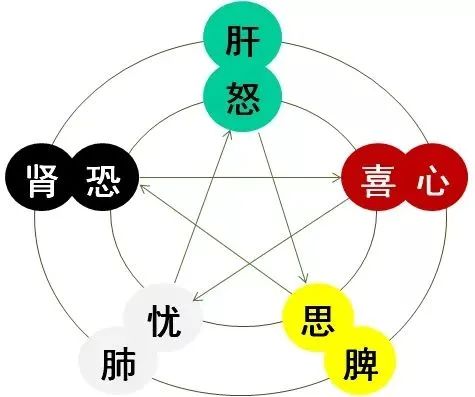
Impact on the Qi Mechanism of the Organs:
“All diseases arise from qi.” Joy, anger, worry, thought, sadness, fear, and shock are referred to as the seven qi, or seven emotions.
In addition to the seven emotions, when combined with cold and heat, they are referred to as the nine qi. Qi is precious for its smoothness and continuous movement, with regular rise and fall.
When qi enters and exits in an orderly manner, rises and falls regularly, circulates throughout the body, and cycles endlessly, there is no disease.
However, if the seven emotions change and the five desires become extreme, the qi mechanism becomes disordered, leading to either qi stagnation or abnormal rise and fall.
When the seven emotions cause stagnation, it can lead to qi not circulating smoothly, resulting in stagnation, or abnormal rise and fall.
When the seven emotions are not released, qi becomes blocked, leading to qi stagnation and blood stasis, qi stagnation leading to dampness and phlegm, and transforming heat that injures yin. This can manifest in the body or in the organs, resulting in various diseases.
Emotional injuries disrupt the qi mechanism of the organs, leading to abnormal blood flow and imbalances in yin and yang.
Different emotional changes manifest differently in terms of qi mechanism disruption.
Anger causes qi to rise, joy causes qi to relax, sadness causes qi to dissipate, thought causes qi to stagnate, fear causes qi to descend, and shock causes qi to become chaotic.

Anger causes qi to rise: qi rising means qi is reversing upwards.
Anger is the desire of the liver.
When faced with grievances or when things do not go as desired, temporary anger generally does not cause illness.
However, if there is violent anger, it can harm the liver, causing liver qi to excessively rise and lead to illness.
When liver qi rises, blood follows the qi upwards, which can lead to dizziness, headaches, flushed face, tinnitus, and in severe cases, vomiting blood or fainting.
Liver qi can also disturb the spleen, causing abdominal distension and diarrhea.
Diarrhea, also known as water and grain diarrhea, presents as undigested stools.
If it affects the stomach, it can lead to belching and vomiting.
Since the liver and kidneys share a source, anger can not only harm the liver but also the kidneys.
Kidney damage leads to symptoms such as fear, forgetfulness, and weakness in the lower back.
The liver is the thief of the five organs, so abnormal liver qi can affect the physiological functions of various organs, leading to multiple pathological changes.

Joy causes qi to relax: qi relaxing means the heart qi is relaxed. Joy is the desire of the heart.
This includes both the relaxation of tense emotions and the scattering of heart qi.
Under normal circumstances, joy can ease tense emotions, making the mood pleasant, and harmonizing qi and blood, reflecting a healthy state.
However, excessive joy can lead to heart disease.
Excessive joy harms the heart, causing heart qi to scatter, leading to fatigue, lethargy, lack of concentration, and even palpitations, confusion, and mania.

Sadness causes qi to dissipate: qi dissipating means the lung qi is consumed. Sadness and worry are the desires of the lungs.
Sadness is an emotional expression of grief and sorrow.
Excessive sadness often consumes lung qi, affecting the heart, liver, spleen, and other organs.
For example, excessive sadness can weaken lung qi, leading to diminished energy and a depressed spirit.
This can manifest as shortness of breath, chest tightness, mental fatigue, and lethargy.

Thought causes qi to stagnate: qi stagnating means spleen qi is blocked.
Thought is the desire of the spleen; thinking is a normal physiological activity of humans. However, excessive thinking can lead to qi stagnation in the middle, causing spleen qi to become blocked, leading to stagnation of food and water, resulting in symptoms such as poor appetite, abdominal distension, and even muscle wasting.
Thought arises from the spleen and manifests in the heart; excessive thinking can harm both the spleen and the heart blood, leading to heart blood deficiency, causing palpitations, anxiety, insomnia, forgetfulness, and vivid dreams.

Fear causes qi to descend: qi descending means the essence qi is sinking. Fear is the desire of the kidneys.
Fear is a psychological effect of cowardice and dread.
Long-term fear or sudden fright can damage kidney qi, leading to what is known as fear harming the kidneys.
Excessive fear can cause kidney qi to become unstable, leading to symptoms such as incontinence, seminal emission, and weakness in the bones.
Fear harms the kidneys, and when the essence qi cannot rise, the heart and lungs lose their nourishment, leading to symptoms such as chest fullness, abdominal distension, anxiety, and insomnia.

Shock causes qi to become chaotic: chaotic qi refers to disordered heart qi. The heart governs blood and houses the spirit; great shock can disrupt heart qi, leading to imbalances in qi and blood, resulting in symptoms such as palpitations, insomnia, irritability, and in severe cases, mental confusion.
Shock differs from fear; fear is self-aware, while shock is not.
Shock can disturb the heart and can also harm the liver and gallbladder, leading to confusion of the spirit, or affect the fetus, causing congenital epilepsy.
Emotional Fluctuations:
Can Change the Disease Condition: Abnormal emotional fluctuations can exacerbate or rapidly worsen the condition, such as in patients with dizziness; due to yin deficiency and yang excess, if they encounter anger, it can cause liver yang to surge, leading to dizziness and even sudden fainting, speechlessness, hemiplegia, or facial drooping, resulting in a stroke.
In summary, the seven emotions of joy, anger, worry, thought, sadness, fear, and shock are closely related to the internal organs.
Emotional activities must be based on the essence and qi of the five organs, and various mental stimuli can only reflect emotional changes through the functions of the relevant organs.
Thus, it is said: “Humans have five organs that transform into five qi, giving rise to joy, anger, sadness, worry, and fear.” Emotional diseases primarily cause dysfunction in the five organs, leading to imbalances in qi and blood, and disturbances in yin and yang. As for which organ is affected, there are both constants and variations.
The seven emotions arise from the five organs and correspondingly harm the respective organs, such as joy harming the heart, anger harming the liver, and fear harming the kidneys… this is the norm.

However, sometimes a single emotional change can harm multiple organs, such as sadness harming the lungs and liver, and multiple emotions can also harm a single organ, such as joy and shock both harming the heart; this is the variation.
In clinical practice, specific manifestations should be analyzed specifically and not treated mechanically.
(Warm reminder: This article is for reference only. Traditional Chinese Medicine emphasizes differentiation and treatment, alleviating symptoms without shortcuts. Individual conditions vary, and patients should consult a doctor to find the most suitable treatment method for themselves.Some images and texts are sourced from the internet, and the copyright belongs to the original authors. If there is any infringement, please inform us.

Special reminder: A beautiful day begins! I hope the articles from the Qi Huang Learning Society bring you a good mood for the day. If you like the article, don’t forget toclick the “Looking” button at the bottom right of the article or share it in your circle of friends!.Due to network limitations, follow me for more, and let’s soar together! May you become your own divine doctor.

